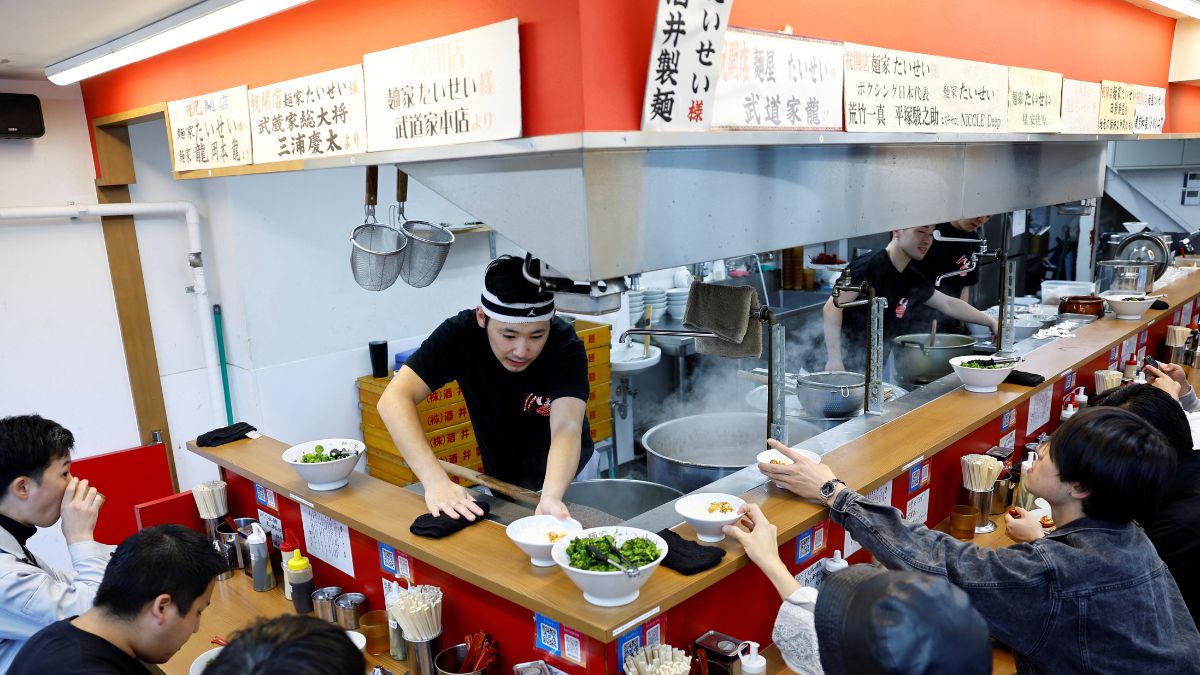Japan’s national comfort food is facing a crisis. This year, a record number of ramen shops are set to shut down, as owners struggle with a cost-of-living crunch that has become a major issue ahead of Sunday’s general election.
A staple across Japan, ramen typically costs less than 1,000 yen (around $6.80) for a hearty bowl of noodles in a rich broth. It is the go-to meal for a quick work break or students looking for a filling bite after school.
However, this year has seen an unusual wave of closures, with many ramen shop owners facing a difficult choice: raise prices past the “1,000-yen wall” to cope with surging costs, or shut down.
ALSO READ | Explained: The daunting challenges Shigeru Ishiba faces as Japan’s new PM
In Tokyo, ramen shop owner Taisei Hikage, 26, is finding it harder than ever to keep prices in check despite the steady flow of customers. Since opening his shop in the capital’s western suburbs 18 months ago, he has raised prices three times but continues to struggle with escalating ingredient and fuel costs. His best-selling dish, “Special Ramen,” now costs 1,250 yen ($8), a 47% increase.
Hikage said, “Traditionally ramen shops were supposed to offer something cheap and tasty."
“It’s no longer cheap food for the masses.”
Shops shut down, filed for bankruptcy
In the first seven months of this year, 49 ramen shop operators with debts of at least 10 million yen have declared bankruptcy, putting 2023 on course to surpass the record 54 bankruptcies seen in 2020, according to credit research firm Teikoku Databank.
The firm reported that costs for ingredients, labour, and electricity required to make ramen have risen by 10 per cent over the past three years.
Tetsuya Kaneko, 44, who raised the price of a standard bowl at Mendokoro Isshou in western Tokyo by 50 yen to reach 1,000 yen, told The Washington Post, “Prices have been rising over the years, but the last three years or so have been unbelievable.”
“I think everyone in the industry is struggling.”
Ramen: A top issue for voters
The challenges faced by the ramen vendors - set for a record number of bankruptcies this year - reflect a cost-of-living crisis that has become a key concern for voters in Japan’s general election on Sunday.
Japan Prime Minister Shigeru Ishiba’s ruling Liberal Democratic Party (LDP), along with opposition parties, has promised a range of measures to help curb rising costs for businesses and households.
ALSO READ | ‘Untidy Cabinet’: What’s the controversy surrounding Japan’s new PM, ministers’ group photo?
These efforts to control inflation in a country just emerging from decades of deflation could sway an election that may see the LDP, which has governed Japan for nearly the entire post-war period, risk losing its parliamentary majority, according to opinion polls.
Hikage, who expects to be too busy in his restaurant to vote, hopes that the winners will consider offering subsidies to ease soaring costs.
Despite repeated price increases, his award-winning ramen remains popular, with long queues outside his shop day and night.
What led to the rise in the cost of ramen shops?
Though Hikage takes pride in using mostly local ingredients, many ramen shops depend heavily on imported supplies like noodle flour.
Japan’s import costs have soared with the yen’s sharp decline, which hit a 34-year low against the dollar this year. Rising grain and energy costs, driven by the war in Ukraine, along with higher labour expenses, have further strained ramen businesses.
The struggle of Japan’s ramen shops reflects a broader trend, where businesses unable to adapt to rising inflation are closing. In the first six months to September, nationwide bankruptcies surged by 18.6% from last year to 4,990 cases, with inflation as the primary cause, according to Teikoku Databank.
“Just like ramen shops, companies offering goods and services that are in demand are transferring costs to product prices and seeing their sales grow. Those struggling to pass on higher costs are being weeded out,” Toshihiro Nagahama, executive chief economist at Dai-ichi Life Research Institute, said.
He also warned that politicians’ frequent support measures might have unintended consequences.
“If too many ‘zombie’ firms, or companies that cannot raise productivity or wages, are kept alive, they could be a drag on the Japanese economy,” Nagahama said.
For now, Hikage is focused on serving quality dishes and hopes the election will bring positive changes.
“Our task now is to endure this and focus on offering something delicious, with our heads bowed to customers,” he said.
ALSO READ | Why Japan has introduced stab-proof umbrellas for travel on trains
The future for ramen lovers
It will take some time before consumers feel the benefit of the yen’s 10 percent gain against the dollar in July, reaching a seven-month high.
Import prices fall as the yen appreciates, but there is about a 10-month lag until this makes it through to food retail prices, Yamaguchi, the economist at Oxford Economics, told The Washington Post.
“At least until the end of this year, the pressure from food prices will continue,” Yamaguchi said.
With inputs from Reuters
)